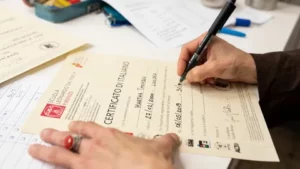An academic editor usually works full-time or freelance with academic publishers, professors, or students to edit and proofread research papers, dissertations, scientific book manuscripts, or other educational-related publications. Most academic editors have degrees in one or more academic disciplines and have strong writing/editing skills. Another important qualification for becoming an academic editor is a deep understanding of academic standards, including citation requirements. An alternative career path, perhaps part-time, might be for an academic editor to work in an online writing service.
Needless to say, that for an average student it is a challenging task to write an essay and to make it error-free. Because far from everyone was born a writer or even fond of reading. It is compulsory to read on a regular basis if you want to write a good essay. For many students, English is not their native language, which makes it more difficult to complete the writing assignment, which requires knowledge of English grammar and punctuation.
Where to find an academic editor
If you set a task to find a professional academic editor to edit an essay or other kind of college paper, you should find no difficulty finding editing services online and essay-editor.net provides professional academic editing for students who need their papers to be edited.
Professional expertise to thoroughly review and correct all forms of academic content before publication is an essential quality for an academic editor. In short, an academic editor must be an expert in language arts. For example, many publications also require manuscripts to be formatted in a specific way, including a specific font and spacing. An academic editor must also be an expert in citation format for a particular discipline. Footnotes and bibliographies requirements may differ depending on the field of study and publication.
Among other jobs, an academic editor may choose to work with the university press, for an individual professor, or with an analytic center. Academic editors can work for academic publishers themselves to oversee the editing, formatting, and proofreading of academic papers. Some professors contract with freelance academic editors to check written papers for grammar, spelling, style, or fact-checking before formally submitting their articles or book manuscripts to academic publishers. An academic editor can also work with experts at a government analytic center or private research foundation to review text in future publications, both online and in print.
Why students need to make an order from academic editing services
- In case a student is too busy, which happens often, to spend time learning stylistics and grammar rules, to order expert editing is an option.
- In case a student tries to do the editing on one’s own but keeps making the same mistakes and/or typos over and over again, which makes it to where a professor keeps lowering the grade.
- In case a student has some personal issues in life due to which s/he has no time to complete the editing.
- In case a student wants to make his or her writing skills better.
- In case, as already mentioned above, English is not a native language for a student.
- In case a student understands that his or her editing skills are not strong enough and ordering editing online is a way out.
- In case a student is running out of time and the deadline is right behind the corner.
- In case a student finished writing and editing but feels like it requires a fresh look to be taken.
Technological advances in the 21st century have made it possible to empower academic editors through online companies. These companies offer various types of editing and formatting services to students. This job often allows the editor to work flexible hours, earn extra income, and help students who may be struggling with their coursework.
Diverse academic editing does not necessarily have a uniform educational requirement. In the United States, however, many academic editors have received master’s or doctoral degrees in English, along with perhaps another specialty in the field of human, social or natural sciences. These degree programs can provide ample opportunities to strengthen editing skills. Many academic editors have teaching experience and the experience of the authors themselves.
Academic editing of any paper is impossible without a literary version of word processing. Literary proofreading, as part of work on the material, involves word processing and error fixing.
The text is kept out of repetitions, ambiguity, stylistic inaccuracies (form of words, appropriateness), etc. The considered type of edition brings the existing content to the best form.
Any type of edit used when working with papers implies the need to study the criteria of stylistic unity, identify lexical, semantic and other gaps.
There is a notion of self-revision, when the author improves his own text. You can write a dissertation or any other college paper on your own. All that is required is free time and the ability to logically present the material. But if there is neither at your disposal, essay-editor.net will come in handy!





Be First to Comment